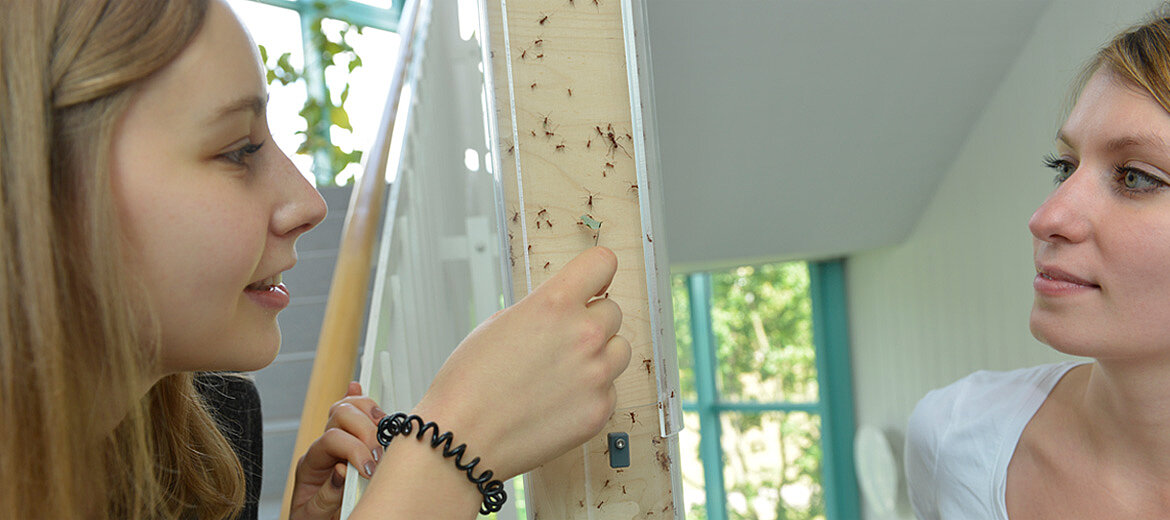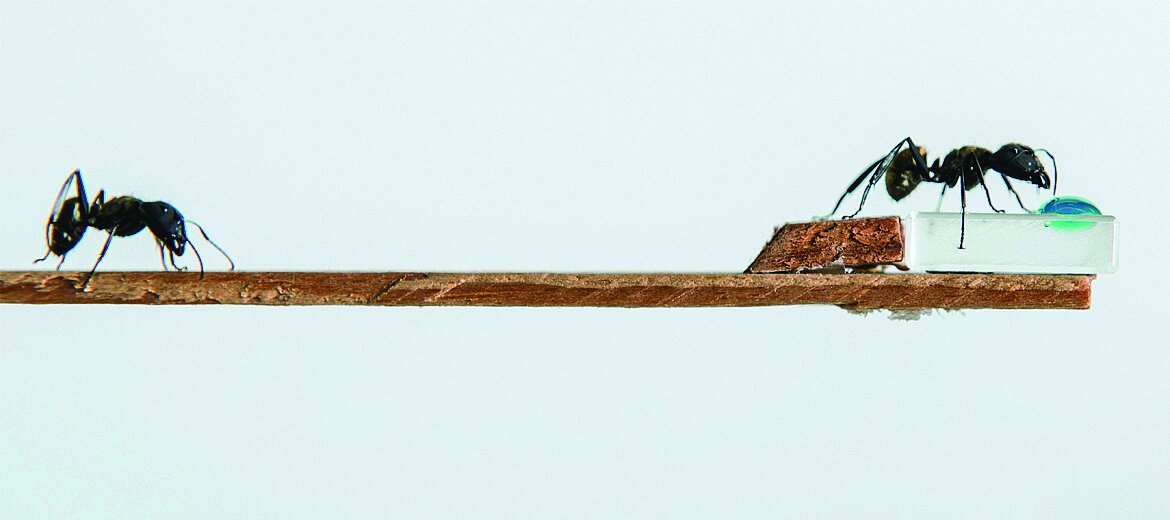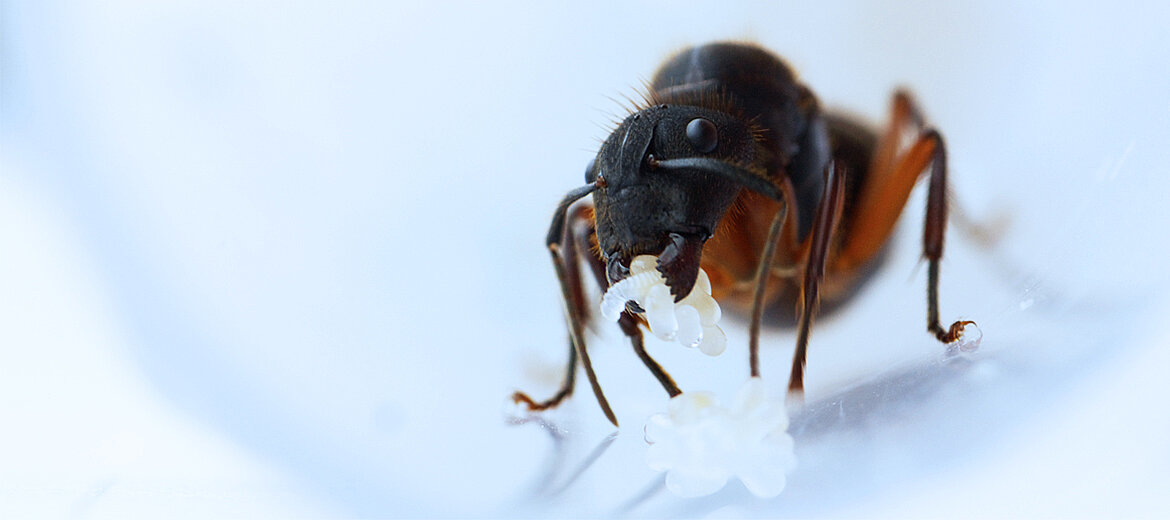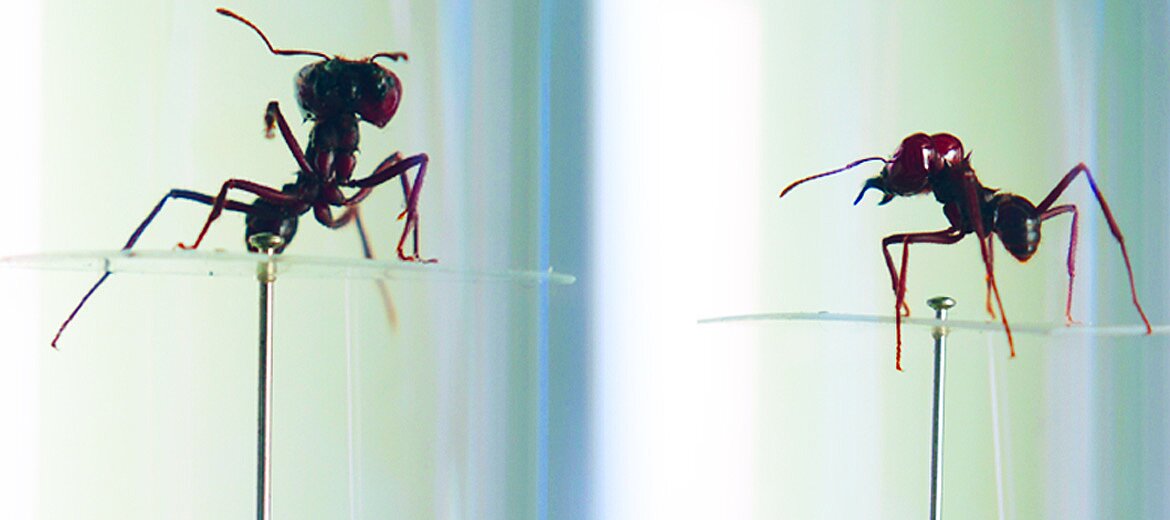Behavioural Neurobiology
Aspects of Neurogenetics and Behaviour, the interaction of individuals in social groups are discussed.Further topics include control of behaviour by the brain, chronobiology/endogenous clocks.
PROGRAMME OUTLINES
Programme Profile: Behavioural Neurobiology (Neuroethology)
The programme gives an overview in the fields of Neurobiology, Behaviour, Sociobiology and Ecology. This includes aspects of neurogenetics, behaviour, sensory systems, physiology, as well as the interaction of individuals, social groups and large populations in complex and variable ecosystems. The students learn basic principles underlying sensory systems, neuronal integration and decision making, chronobiology/endogenous clocks, integrative approaches to elucidate complex correlations in the field of behavioral biology, and obtain insight into current research in the field. The two topics selected of which each one is consisting of two theory modules and a practical course unit provides both theoretical and experimental skills. Further research training is provided in a selected field of interest, and the students are actively involved in ongoing research projects and learn to independently plan and perform both theoretical and experimental work and finally, to summarize and discuss the results obtained in the thesis.
Objectives and Learning Outcomes
On the background of a bachelor degree in Biology/Life Sciences, the students become familiar with various aspects of Neurobiology and Organismic Biology with a special focus on Neuroethology. Particular topics within the programme profile provide theoretical knowledge, skills in scientific thinking, experimental planning and critically discussing the results obtained. The students are enabled to address scientific questions in the fields of Neurobiology/Neurosciences, Behavioral Biology and the various interactions of organisms and populations in complex habitats. They know to approach scientific problems both theoretically and experimentally, and - based on the results obtained - to further develop scientific models and hypotheses.
Programme Schedule
- S1 TOPIC 1 (2 theory modules plus practical course)
- S2 TOPIC 2 (2 theory modules plus practical course)
- S3 Advanced experimental training (F2, 15CP) + additional special courses (15 CP)
- S4 Thesis + final colloquium
Curriculum
For detailed informations on the following modules listed are available in the Online Course Book, Master Biosciences, Module Group 4 WueStudy
Year 1 (Winter-Semester)
- Neurobiology, Behavioural Physiology and Animal Ecology
- Neurogenetics of Behaviour
- Neurobiology F1 (Practical Course)
- Additional Courses
Year 1 (Summer-Semester)
- Experimental Sociobiology
- Endogenous clocks
- Behavioral Physiology and Sociobiology F1 (Practical Course)
- Additional Courses
Year 2
- Neurobiology F2 or
Behavioral Physiology and Sociobiology F2 (Practical Course) - Additional Courses
- Thesis
- Thesis Colloquium
STUDY PROGRAMME
Modules - Theory
Neurobiology, Behavioural Physiology and Animal Ecology (Lecture series)
C: "Insects in a changing environment": Changes in environmental conditions impact all organisms on earth. Animals make use of endogenous clocks to predict and anticipate daily or seasonal changes of the environment. Environmental changes, including man-made like climate change, affect the neurobiology, behaviour, navigation, and chemistry of animals, as well as biotic interactions and the distribution of species and communities. In response to environmental changes, animals have evolved many adaptations on various levels – from the molecular to the behavioural level.
The lecture series gives an introduction to the effects of changing environments on different aspects in insect biology, and highlights underlying neuronal, physiological, behavioural, and ecological mechanisms. Animal adaptations which have evolved to cope with these environmental changes as well as associated extinction risks of species will be discussed.
LO: The students obtain an overview in organismic biology including neurobiology, behavioural biology and ecology. They learn about the complex interactions of living organisms and the adaptive responses of animals to environmental changes.
Flying senses
C: This module examines the anatomical and neurophysiological basis of various sensory perceptions. A comparison is drawn between the sensory systems of invertebrates, particularly insects, and vertebrates. Particular attention is paid to the specific adaptations and specializations that insects have developed to suit their respective environmental conditions and ecological niches. A focus is placed on flying insects such as mosquitoes, moths, and flies. It examines how these animals detect sensory stimuli, how these stimuli are neuronally processed, and how behaviors arise from this. The focus is on the following sensory modalities: olfaction and taste, touch, vibration, hearing, vision, heat, and the electrical and magnetic senses. The goal is to understand the complex relationships between sensory perception, neural processing, and behavior.
LO: Students will acquire knowledge of the general principles of the function of sensory systems and learn about the similarities and differences between these systems in invertebrates and vertebrates. They will also gain a substantive and methodological insight into current research topics in sensory physiology and neurobehavioral research. The seminar will provide practice in presenting and discussing scientific results in English.
Endogenous clocks
C: An introduction into endogenous clocks of unicellular organisms, fungi, plants and animals is given, with focus on the neuronal organization of the clock in the brain of mammals and insects. The biological functions of endogenous clocks and the underlying mechanisms will be discussed on the molecular, cellular and organismic level. How clocks adjust to a 24h day with variable photoperiods will be explained. Applied aspects regarding e.g. shift work or jetlag will also be included.
LO: The students learn basic principles underlying chronobiology/endogenous clocks and obtain insight into current research in the field. In the seminar, the students train presentation skills as well as the critical discussion of scientific results in the field of chronobiology.
Neurogenetics of Behaviour
To understand how the brain controls behaviour is at the heart of neuroscience. Both brain and behaviour can be overwhelmingly complex and plastic, yet neurogenetic methods are powerful tools to dissect the principles of how the brain controls behaviour. In both lecture and seminar, a state-of-the art view on current and important topics of behavioural neurobiology are given. The topics which sleep, control of appetite and feeding, social behaviour, mating, mirror neurons, molecular mechanisms of auditory-guided behaviour, neurogenetic techniques all focus on genetic model systems such as the fruitfly Drosophila, the mouse, and the nematode C. elegans.
LO:The students obtain insight into the topics and methods of current neurogenetic and neurobiological research. In the seminar, the students train presentation skills as well as the critical discussion of scientific results in the field of neurogenetics of behavior. They further get familiar when and how to apply genetic model systems to address specific questions experimentally.
Experimental Sociobiology
C: The lecture focuses on the origins and multiple dimensions of social behaviour and elucidates basic behavioral, physiological and neurobiological mechanisms giving rise to the organization in social groups. Active ongoing research topics at the department of Behavioural Physiology and Sociobiology are particularly considered. In the according seminar, current publications in the field are presented and discussed.
LO: The students experience the usefulness of integrative approaches to elucidate complex correlations in the field of behavioral biology. They also gain the capability to relate varying aspects of sociobiology, to translate and to raise further scientific questions as well as to critically discuss current scientific publications in the field of sociobiology.
Modules – Practical Courses
Behavioral Physiology and Sociobiology F1 (Practical Course)
C: Students will be integrated in one of the research groups at the department and work independently on one of the actual topics in the field of behavioral physiology and sociobiology. Thereby they will gain insight into the latest physiological, neurobiological and behavioral methods. The obtained results will be graphically and statistically analyzed, summarized in a scientific report and finally presented in a talk. Please contact the research groups at the department for available topics and possibilities.
LO: The students are qualified to perform independently scientific experiments in the field of behavioral physiology and sociobiology. Furthermore they learn to process and document obtained results and present them to a scientific audience.
Behavioral Physiology and Sociobiology F2 (Practical Course)
C: Students will be integrated in one of the research groups at the department and work independently on one of the actual topics in the field of behavioral physiology and sociobiology. They will learn to plan experimental series and to apply the latest physiological, neurobiological and behavioral methods. The obtained results will be graphically and statistically analyzed, summarized in a scientific report and finally presented in a talk. Please contact the research groups at the department for available topics and possibilities.
LO The students are qualified to plan and perform independently scientific experiments in the field of behavioral physiology and sociobiology. Furthermore they learn to process and document obtained results and present them to a scientific audience.
Neurobiology F1 (Practical Course)
C: In the F1 practical course a current topic in the field of neurobiology is investigated experimentally. The practical course is offered in different specializations: molecular, clinical, cellular, developmental or behavioural neurobiology or in neurogenetics. In the frame of the course, the students perform literature searches, apply a variety of neurobiological methods including electrophysiology, immunohistochemistry, molecular biological techniques, clinical and neurogenetic techniques. They also become familiar with several different model systems that are common in the field of neurobiology. The students document the results obtained according to common scientific standards, discuss those and present the evaluated data in scientific talks, publication or seminar paper.
LO: The students know about various experimental options commonly used in neurobiology. They learn to select appropriate methods and model systems, respectively, to address particular research problems. They train to plan and perform scientific experiments, to evaluate data obtained, to critically discuss them and to develop new models and hypotheses on their findings.
Neurobiology F2 (Practical Course)
C: Individual students work independently on their own samller project within a current line of research at the Chair. Neurobiological, genetic or molecular techniques are tested and adapted according to the research aim. The progress of the experiments and the current line of research are documented and presented as either a scientific talk, publication or seminar paper. Participation in the department seminars will give insight into current research topics. Please contact the research groups at the department for available topics and possibilities.
LO: The students are qualified to independently perform scientific experiments in the field of neurobiology, neurogenetics and chronobiology, and to adapt a research plan according to the experimental progress. They learn how to process, document and critically discuss obtained results and to present them to a scientific audience.
ADDITIONAL COURSES
Additional Courses (5 ECTS unless indicated)
Students can choose from a variety of courses and modules from our Master in Bioscience curriculum. Particularly close courses are:
Animal Communication (currently offered only in German language)
C: The lectures deal with physiological and neurobiological principles of the different communication channels used by animals, but also highlight adaptive values and evolutionary aspects of animal signaling. In a follow-up seminar session students will deepen their knowledge by presenting and discussing actual papers related to the topic of the lecture.
LO: The students experience the benefit of an integrative approach when confronted with complex biological issues. They learn to connect the findings of different research areas like physiology, neurobiology, behavior and ecological conditions in order to gain a
Neuromodulation and neuronal development
C: Neuromodulation: Cellular and molecular biology of neuromodulators and their receptors, modulation of synaptic transmission and membrane potential, theoretical and functional aspects of neuromodulation, model systems used to study modulation of neuronal circuits
Basics of molecular developmental neurobiology: Focus on the establishment of the neuroectoderm, pattern generation and regional specification, neuronal precursors, neuronal growth, differentiation of neurons, axonal pathfinding, neuronal connectivity.
LO: The students learn basic principles underlying neuromodulation and neuronal development and obtain insight into current research in the field. The seminar practises presentation skills and the discussion of scientific results.
Immunology 1 B
C: Basic concepts of modern cellular and molecular Immunology.
LO: Participants learn to read, critically discuss and present current concepts in immunology at (advanced) text book level. Reception of talks on current topics in immunology which are given by varying researchers covering a broad range of immunological topics.
Immunology 2 B
C: Current topics in molecular and cellular immunology with emphasis on autoimmunity. allergy, immunomodulation, cancer and transplantation immunology, immunity of infection and evolution of the immune system.
LO: Capability to read, critically discuss and present current concepts in immunology on the basis of original literature and primary data.
Ecology and Taxonomy of Insects
C: Identification and classification of the characteristics of different groups of arthropods, especially insects. Knowledge of special form is provided. Observation and recording of arthropods in habitats. Experimental laboratory and field work on ecological or behavior biological characteristics of the respective groups of arthropods. In addition, also compilation of species richness and niche differentiation. The aim is to link the phylogenetic and morphological characteristics of arthropods with their ecological functions.
LO: The students gain knowledge of defining typical families and representatives of major insect orders. They are qualified to apply special identification keys, record and evaluate special behaviors. They are able to design and evaluate experimental approaches in ecological laboratory and field studies.
Additional Courses & Final Thesis
Modelling in Ecology
C: On the basis of exemplary tasks in Ecology, the students will learn about different simulation techniques and modelling methods. In the same time, they will also develop their own simulation program to address demographical or evolutionary questions.
LO: The students expand their knowledge in theory and practice of ecological modelling and they are qualified to develop, apply, and interpret adequate modelling techniques.
Tropical Ecology
C: In a tropical ecosystem, small project with ecological or nature conservation related issues will be performed. Here the students should learn about the steps of experiment design, implementation, data analysis, up to data presentation. In the evening seminar, recent publications are presented in the field of tropical Ecology and will be discussed.
LO: The students learn about various tropical Ecosystems and acquire further knowledge of ecological and nature conservation related research in the tropics. They learn field ecological methods for quantitative detection of insects and their biotic interactions, as well as acquire statistical knowledge in the field of data analysis.
Linux and Perl
C: Introduction into the operation system Linux, writing computer programs using the programming language Perl to answer bioinformatical questions.
LO: Students are able to handle the Linux as user and they are able to write simple Perl scripts to answer bioinformatical questions.
Presentation of Scientific Data
C: The students write a scientific mini review including correct citation and learn various options to present scientific data including manuscript writing followed by an oral presentation (15 min).The manuscript is based on original papers as well as on reviews and follows the instructions of a scientific journal of choice, which may be found at the home page under e.g. “Instructions to Authors”. Both length of chapters and structure of the article should be based on the style of the selected journal.Attendance at 20 or more scientific talks (e.g. defense of doctoral thesis, presentation of research projects, retreats ) including presentation by guest speakers.
LO: The students are familiar with the deatails of publishing scientific data in written and oral form. They have become familiar with the methodology of scientific publishing in oral or written fashion. Furthermore, they have trained English skills in both reading, talking and writing.
Quality Assurance, Good Practice, Biosafety and Biosecurity
C: Good Practice in the Biosciences, quality assurance approaches and quality culture. Structure, idea and basic principles of quality management approaches, DIN EN ISO 9001, regulatory documents and framework in the biosciences including biotechnology, biosafety, biosecurity, risk assessment.
LO: The students are familiar with basics of “Good Practices” in Research and Development, and have understood the basic principles of quality management circles. They have a distinct sensibility in biosafety and biosecurity issues and know the proper handling of biological agents and organisms. In addition, they have developed a sense to the complex interdependences in nature and can critically discuss socio-ethical issues in the bioscience area.
FINAL THESIS
Thesis (25)
C: A defined scientific question is addressed by adequate techniques. Students plan and perform experiments to solve problems or summarize and interpret existing data. The students have to develop a research plan and apply advanced and novel techniques in the context of a given research project according to good scientific practice. The results are summarized in a written thesis. The project lasts for six month.
LO: Students are qualified to scientifically work on a topic on their own. They are competent to discuss the current research in the field. They are competent to work according to good practice and to document, interpret and to discuss their results. They are competent to discuss and to defend their data in the scientific community.
Thesis Defense / Oral examination Biology (3)
C: Verification of thesis content through oral examination. Total length should not exceed 45 min. (30 min. plus 15 min. of questions pertaining to the thesis, as well as related subjects)
LO: The students are able to present the results of their thesis work to a public audience in a limited time and they are able to critically discuss questions and concerns.
Contact

Dr. Oliver Geissler












